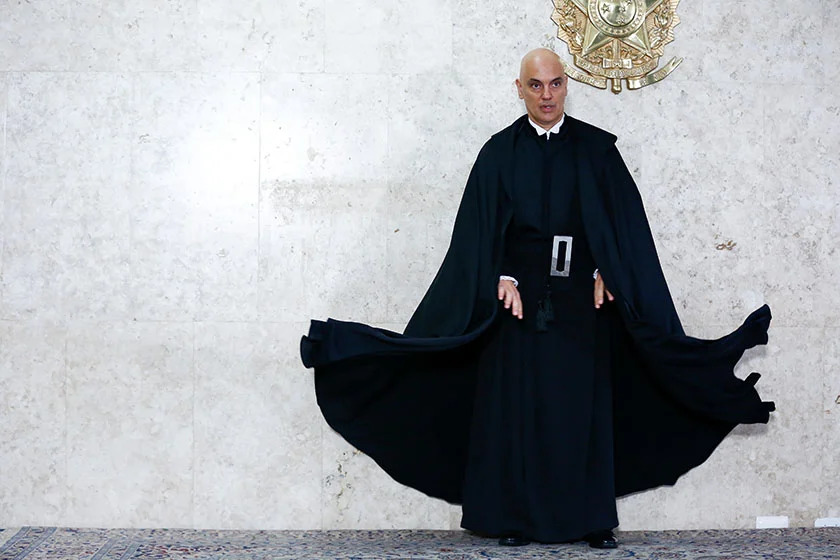RIO DE JANEIRO, BRAZIL – Only 23% of Brazilians think the Supreme Court’s (STF) work is excellent or good and 34% think it is terrible.
The data was collected between December 13 and December 16 through a face-to-face survey by Datafolha of 3,666 people 16 and older in 191 cities.
The negative impression is even more pronounced among voters who plan to vote for Jair Bolsonaro (PL) next year.
Looking only at this group, only one in ten respondents (12%) approve of the Supreme Court’s work, while 57% disapprove.
Among Lula da Silva’s (PT) declared voters, disapproval of the court drops to 24%, ten percentage points below the general average. On the other hand, 30% like the performance of the college.

‘LA LOI C’EST NOUS’
There is widespread talk of a so-called “dictatorship of the toga” in Brazil. With recurring regularity, some or all Justices overrule the decisions of the Bolsonaro government.
Here are some examples from recent weeks in which the STF has undermined the policies of the democratically elected president and his ministers:
December 16
Brazil’s Supreme Court votes by a majority in favor of mandatory vaccination passports for travelers entering Brazil
(President and Ministry of Health oppose mandatory vaccination passport).
December 12
Brazil’s Supreme Court overrules Health Ministry and requires proof of vaccination for foreign visitors
November 13
Brazil’s Supreme Court overturns labor legislation banning hiring and firing for lack of vaccination
September 30
Brazil’s Supreme Court reinstates vaccination certificate in Rio de Janeiro
September 17
Brazil’s Supreme Court suspends Bolsonaro’s decree, keeps gun control in place
Critics say Brazil’s Supreme Court is setting precedents potentially dangerous to democracy. The STF is said to have adopted unorthodox measures and largely ignored the Federal Prosecutor General in its attempt to restrain what is said to be a Bolsonarist onslaught against governmental institutions.
Some say that sidestepping due process, regardless of the intended purpose, could lead to the creation of dangerous precedents that, in the future, could be used arbitrarily by the Judiciary in general.
BOLSONARO ASKED CONGRESS TO IMPEACH SUPREME COURT JUSTICES
USP Law School professor Rafael Mafei compares the relationship between the Planalto Palace and the STF to a soccer match where tempers flare and fouls become increasingly harsher. “In these cases, there are only two possible outcomes: either the opposing party is intimidated and retreats, or it escalates into a generalized clash, and the game stops.”
Jair Bolsonaro announced on August 14 that he would ask Congress to initiate impeachment proceedings against two Supreme Court Justices who have ordered legal action against him, whom he accuses of violating the Constitution.
The announcement was a new step in the institutional crisis the country was and still is experiencing due to the confrontation between the head of state and members of the country’s highest Court, who claim to be trying to curb abuses.
“Justices Alexandre de Moraes and Luis Roberto Barroso of the Supreme Federal Court have long exceeded the limits of the Constitution with their decisions,” the President said back then.
Bolsonaro claimed that Barroso is violating his right to free speech by prosecuting him for publicly doubting the security of Brazil’s electronic voting system and insinuating that fraud is possible.
Judge Barroso and President Bolsonaro have clashed verbally dozens of times. In August, this dispute, which appears to be personal in nature, escalated and started to affect the entire country, including foreign investors interested who increasingly began fearing a political and institutional crisis.
There were five cases against President Bolsonaro before the Supreme Court and one before the Electoral Tribunal: for alleged attacks on the electoral system; for divulging a confidential court document; for spreading allegedly anti-democratic messages; for allegedly interfering with the federal police; and for allegedly protecting corruption in the purchase of vaccines against Covid-19.
Critics say that this multiplicity of investigations against the incumbent president is intended to create anti-Bolsonaro sentiment among Brazilians in light of the upcoming 2022 elections, with an implicit message that …..Bolsonaro is not serious and should not be elected for a second round.
A calculation that has worked out perfectly well so far.

